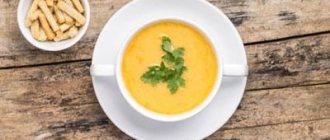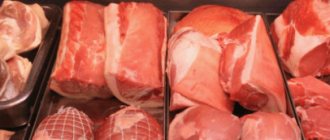Diarrhea never occurs out of nowhere - it is usually a protective reaction of the body to harmful substances, bacteria and toxins that have entered the body. To quickly remove them from the gastrointestinal tract, the intestines begin to work harder. Its peristalsis increases many times over, which is why food passes through it more quickly and is eliminated, carrying with it all the dangerous components.
However, although diarrhea performs a protective function for the body, it is dangerous because it causes dehydration. Neither liquid, nor vitamins, nor microelements are absorbed in the intestines. In order not to aggravate the situation and not put an increased burden on the digestive system, you need to drink water more often and not eat anything for at least four hours, or better yet, fast for half a day. And only then is it permissible to include in the menu products that strengthen the stool. Often people suffering from diarrhea wonder if they can eat bananas in this condition.
Garlic is an effective remedy for diseases of the digestive tract
Not only our well-being, but also the harmonious functioning of all organs and systems directly depends on the functioning of the gastrointestinal tract. That is why normalization of digestive processes is a paramount task that requires our constant attention.
Garlic, thanks to its healing qualities, helps to cope with various problems of the digestive tract. In addition, it has long been proven that garlic is one of the most effective natural antibiotics. It is these qualities of the product that traditional and traditional medicine doctors use in the fight against various diseases of the digestive system. Previously, it was believed that stomach and duodenal ulcers are formed solely from stress and sharp fluctuations in the acidity of gastric juice.
However, recent studies have shown that peptic ulcers are often caused by the bacterium Helicobacter. So in drug therapy, in addition to drugs that coat and regulate acidity, antibiotics also appeared. Garlic effectively inhibits pathogenic bacteria, performing the functions of an antibiotic, safe and effective. During the acute period of the disease, garlic is contraindicated. However, when the disease enters the chronic phase, garlic can significantly improve the well-being of patients, normalize digestion and improve the condition of the mucous membrane.
In order to cope with the bacteria that cause the disease, garlic can be introduced into the daily diet by adding a finely chopped clove to a hot dish during lunch as an aromatic and healing seasoning. After a few weeks of systematically consuming garlic, you will not only feel relief, but your appetite will also increase significantly. Or you can prepare a healing elixir from cabbage and garlic juices.
The fact is that white cabbage juice is an effective remedy against peptic ulcers, and garlic juice increases its effectiveness several times. Dosage: add 5 ml of garlic juice per ml of cabbage juice, take twice a day immediately before meals. Pain reliever. If you are worried about moderate pain in the stomach, then carry out a three-day course of treatment with the following composition: crush three garlic cloves in a mortar, add a coffee spoon of table salt, pour in ml of boiling water, cover the container and leave the medicine for an hour.
Take ml three times a day strictly before meals. Violation of the intestinal excretory function is called constipation. People suffering from frequent constipation eventually become dependent on laxative medications. To prevent this, it is necessary to regulate the performance of the intestines and establish its smooth functioning through diet, moderate physical activity, maintaining a water regime of at least 2 liters of spring water per day and lifestyle changes.
Anyone suffering from constipation should enrich their diet with foods high in fiber or take it separately. The greatest amount of fiber is found in unprocessed cereals, bran, sprouted grains, fresh vegetables and fruits. Garlic is not a laxative, however, its benefits are undoubted in cases where constipation is caused by depressed digestive function or a violation of the intestinal microflora, dysbacteriosis.
After changing your diet, you should undergo a two-month course of treatment with garlic. To do this, during the first three days you need to eat fresh garlic cloves, adding them to different dishes or simply swallowing them like tablets and washing them down with water. Starting from the 4th day, eat garlic cloves daily or make garlic kefir from them. Stools gradually normalize, appetite improves, symptoms of flatulence and bloating disappear, since garlic effectively inhibits putrefactive bacteria and suppresses the processes of putrefaction and fermentation in the intestines.
One of the proven remedies for constipation is weak one-day kefir. The combination of kefir and garlic is an ideal combination for improving intestinal motility and healing microflora. To prepare a medicinal cocktail, you will need a glass of kefir and garlic cloves. If desired, to improve the taste and healing properties of the drink, add finely chopped parsley, coriander, celery and dill, a teaspoon and a pinch of sea salt.
You should drink 1 glass of garlic kefir per day. Diarrhea is usually caused by the presence of pathogenic bacteria in the gastrointestinal tract. Garlic effectively destroys most of them, including the dysentery bacillus. To prevent diarrhea, especially during travel and eating unfamiliar exotic foods, you should eat a garlic clove every day on an empty stomach; you can simply swallow it like a regular pill, and your breath will remain fresh. If you have already started to have an upset stomach, then you need to eat at least 3 cloves per day.
Strong rice water with the addition of crushed garlic cloves also helps with diarrhea. For dysentery, you need to eat 4 cloves a day and follow a diet. Relief occurs the next day, and recovery within a few days.
Take these useful recommendations into account, treat yourself with medicinal garlic and always be cheerful and healthy! Your email will not be published. Tuesday, Site menu Home page About us Feedback. Garlic is an effective remedy for diseases of the digestive tract. Related materials Garlic and mint - a healing composition Garlic is an active assistant in the treatment of skin diseases Milk and garlic - a healing combination.
Add a comment Cancel reply Your e-mail will not be published. Site menu. Home page About us Feedback. Diseases and pests of garlic Video Growing garlic Summer cottage, vegetable garden, cooking Interesting things about garlic Treatment with garlic Recipes with garlic Properties of garlic Varieties of garlic Partner articles.
Let us recall that the main therapeutic properties of garlic are the following: - antiseptic, - antimicrobial, - antiputrefactive, - antibacterial, - anthelmintic, - immunomodulating, - disinfectant. Garlic and peptic ulcer Previously, it was believed that stomach and duodenal ulcers are formed solely from stress and sharp fluctuations in the acidity of gastric juice. How to use garlic to treat peptic ulcers In order to cope with the bacteria that cause the disease, garlic can be introduced into the daily diet by adding a finely chopped clove to a hot dish during lunch as an aromatic and healing seasoning.
Garlic for constipation Violation of the intestinal excretory function is called constipation. Treatment of constipation with garlic Garlic is not a laxative, however, its benefits are undoubted in cases where constipation is caused by depressed digestive function or a violation of the intestinal microflora, dysbacteriosis. Garlic kefir for constipation One of the proven remedies for constipation is weak one-day aged kefir.
Garlic for diarrhea Diarrhea is usually caused by the presence of pathogenic bacteria in the gastrointestinal tract. Category: Treatment with garlic Recipes with garlic Properties of garlic Tags: constipation , treatment , stomach treatment , treatment with garlic , recipes , recipes with garlic , properties of garlic , garlic kefir Views: No comments.
What are the signs of intestinal disease?
You should think about indigestion in the intestines if:
- pain around the navel, lower abdomen on both sides, cramping or pulling, associated with eating;
- diarrhea or constipation;
- constant bloating, rumbling;
- vague nausea, loss of appetite;
- there is an admixture of blood or mucus in the stool;
- prolonged low temperature;
- unmotivated fatigue, weakness;
- weight loss.
These symptoms require consulting a doctor, finding out the cause and timely treatment. In therapy, the role of medications, regimen and diet is equally important.
Remedies for diarrhea: medications for an urgent solution to the problem
Intestinal dysbiosis is a violation of microbial balance, that is, a decrease in beneficial microflora in the intestines. Dysbacteriosis has a negative impact on the immune system and the functioning of the entire gastrointestinal tract. This pathology occurs due to poor nutrition, as a result of stress and nervous strain, as well as after taking antibiotics and other potent drugs. Garlic is very effective in restoring normal intestinal microflora, as it suppresses the development of pathogenic microorganisms in the intestines. However, its long-term use can cause irritation of the mucous membrane, so you should strictly follow the dosage and not take infusions for more than two weeks.
Diet for infants
You should not force your child to eat
Despite the fact that doctors previously recommended abstaining from any food at all, modern pediatricians do not adhere to this concept. Lack of nutrients during fasting will negatively affect the development of the baby, lack of protein for his growth, sudden weight loss, and decreased immunity.
In such conditions, it will be very difficult for the baby’s body to recover quickly, tissue regeneration will slow down and the intestinal mucosa will be damaged for a long time. Therefore, it will be impossible to switch to regular food for a long time.
For breastfed babies, it is recommended to continue feeding much more often, while reducing the single dose.
Breast milk is an indispensable product for babies up to one year old, even during diarrhea: the biological active substances it contains help strengthen the immune system and help the baby cope with the disease.
Feeding bottle-fed babies must be approached individually. The amount of mixture is determined based on the frequency of regurgitation and the presence or absence of vomiting. Feeding should be done every 2 hours, the volume of the mixture should be 50 ml. On the 4th day, feeding is gradually transferred to normal mode. Babies from five months of age are allowed to feed with dairy-free rice or buckwheat porridge. Children aged eight months need to add yolk, meat broth, jelly and meat puree to their diet.
What and in what quantities can you eat if you have diarrhea?
Currently, we are not allowing visitors into our facilities, with very limited exceptions. Read more. Diarrhea is loose or watery stools, more frequent bowel movements than usual, or a combination of the two. If you have diarrhea, you are more likely to become dehydrated because there is not enough fluid in your body. Many patients experience diarrhea at some point during their cancer treatment. They will help you figure out the best way to deal with it. Their recommendations may differ from the advice below. Depending on the cause of your diarrhea, taking medications for it may harm you.
There is a lot of information about garlic.
What are the benefits of broth?
Chicken soup is considered a low-fat dish and in most cases it can be eaten for diarrhea. With diarrhea, the body loses a large amount of fluid. The body needs help to replenish lost water. However, with diarrhea, the diet should be gentle. Low-fat soups have a good effect on the intestinal wall, having a slight anti-inflammatory effect. Broth for diarrhea delivers the nutrients necessary to fight infection, without unnecessarily burdening the sick body.
What foods should you eat if you have diarrhea?
Otherwise, the answer to this question is very simple. Check the list of products and you will find chicken eggs - no more than one piece per day. As an additive to any approved dish or on its own as a steam omelette; soft-boiled egg. Still have questions? The thoughtful reader still has. Everything that is written below is for such a reader.
On the first day you should eat bland, soft food.
Diarrhea, or colloquially diarrhea, is frequent loose stools more than 3 times a day, often accompanied by pain in the abdominal area of varying degrees of intensity. Most often it is a symptom of an acute intestinal infection - bacterial, viral or parasitic. Mostly occurs from July to September, as well as during vacations, trips and travel, which is associated with dietary habits and personal hygiene. However, in everyday life no one is immune from diarrhea. Let's figure out what leads to stool upset and what means can stabilize intestinal function. According to WHO, 1.7 billion cases of diarrhea are registered annually in children, mainly under 5 years of age. But these statistics are mainly generated by hot countries with limited access to water and unsanitary living conditions [1].
Making chicken broth
In order for chicken broth to bring only benefits for disorders, it is important to know how to prepare it correctly. It should be borne in mind that steep broths are not suitable for treating people with intestinal problems.
The ideal option for preparing broth for diarrhea is to drain the water three times. The third broth is prepared as follows:
- when the water with the meat has boiled, the composition should be drained and water should be added again;
- bring to a boil and repeat the procedure;
- pour the third water over the meat and only then prepare the soup.
It is recommended to prepare beef broth in the same way. Only the first time you need to not only bring it to a boil, but also boil the composition for about 20 minutes.
After the broth is ready, remove the meat from it and grind it through a meat grinder. This is necessary, since the intestines will not be able to absorb large fragments during diarrhea. It is important that he spends energy on recovery, and not on digesting food.
Only after this can you start preparing the soup with any suitable ingredients.
Features of dietary table No. 3
Table No. 3 is used for physiological conditions (pregnancy) and intestinal diseases, with constipation. These include those that arose during travel due to climate and water changes, against the background of the required long-term bed rest, enterocolitis, partial adhesive obstruction, general degenerative disorders in old age, physical inactivity.
If constipation is caused by an exacerbation of a chronic disease, then the recommendations must be adjusted, since diet 3 includes irritating factors. The purpose of the diet is:
- increased peristaltic active movements of the large intestine;
- elimination of processes of increased fermentation and rotting;
- compensation for the irritating effects of bile acids on the intestines.
The criteria for benefit are regular bowel cleansing and cessation of bloating. Products to be excluded include those that do not contain enough fiber and are quickly absorbed:
- rich pastries, soft wheat bread, culinary and pasta products, cakes, sweets;
- dishes from fatty meat and fish, rich broths;
- canned food, smoked sausages and sausages;
- whole milk;
- rice porridge, semolina, casseroles with these cereals;
- legumes (peas, beans, lentils);
- fried eggs;
- garlic and onion;
- mushrooms in any form;
- chocolate, ice cream;
- alcohol, carbonated drinks.
The consumption of tea and coffee, cocoa, and berry jelly is limited.
You will need to exclude radishes, radishes, and cabbage from the set of vegetables.
Among the berries, quince, dogwood, fresh blueberries, compote or jam are not recommended. As for fruits, you need to avoid pears, bananas, and grapes. People's favorite onions and garlic, as well as radishes and radishes, contain a significant amount of extractive substances that irritate the intestinal mucosa. Sweets and baked goods contain too many light carbohydrates, which provoke fermentation and support rotting.
Products that help cleanse the intestines:
- yesterday's dried rye or rye-wheat bread, varieties “Dietary”, “Otrubnoy”, “Multi-grain”, dry bread;
- low-fat soup made from meat and fish;
- steamed cutlets, meatballs, boiled chicken dishes;
- "Milk" sausages;
- kefir, yogurt, yogurt, ayran and other fermented milk drinks made no more than 3 days in advance (at a different time they have a fixing effect);
- low-fat cottage cheese, mild hard cheese.
Milk is allowed to be added to porridge. Cereal products are boiled in water; the most useful compositions are buckwheat, millet, pearl barley, and oatmeal). Eggs can be eaten hard-boiled or added to first courses twice a week. It is recommended to prepare salads with vegetable oil more often from fresh vegetables. Healthy: cauliflower, cucumbers, zucchini, carrots, pumpkin, beets, tomatoes, vegetable juices.
Shown are fresh berries and fruits (including those excluded), dried fruit compote. Dried apricots, figs, and raisins are especially valued. For drinking, weak green tea and herbal infusions are used. You can eat sweets based on fruit jelly (marmalade, marshmallows), small amounts of honey, and jam made from permitted berries and fruits.
Table No. 3 allows you to eat a total mass per day that does not exceed 3 kg; it is useful to drink liquid in a volume of 1.5–2 liters. When the requirements are fully met, the diet allows for long-term use and choice of products. Some nutritionists consider its significant drawback - the ban on whole milk.
The importance of dietary nutrition for intestinal dysfunctions
For any diseases of the stomach and intestines, a diet is mandatory. It is developed by nutritionists; the controlled list of products includes not only what you can eat, but also drink. Requirements for the power plan include prohibitions:
- for spicy food;
- fatty and fried foods;
- fruits and vegetables with a laxative effect;
- dairy products;
- alcohol, coffee, honey;
- mushrooms and berries;
- freshly baked bakery products, including bread itself;
- soups and borscht in the first broths.
If diarrhea has already begun and is accompanied by pain, then taking painkillers is prohibited. This is due to their adverse effect on the gastrointestinal mucosa, which can aggravate the patient’s condition.











